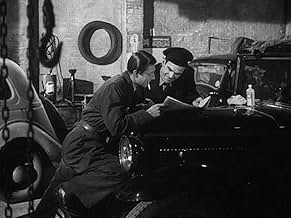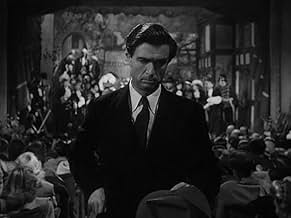Añade un argumento en tu idiomaOn the south west coast of England, two crusading reporters revive a failing newspaper and expose local corruption.On the south west coast of England, two crusading reporters revive a failing newspaper and expose local corruption.On the south west coast of England, two crusading reporters revive a failing newspaper and expose local corruption.
- Dirección
- Guión
- Reparto principal
Patric Doonan
- Burton
- (as Patrick Doonan)
Andy Alston
- Police Constable at Court
- (sin acreditar)
Stanley Baker
- Barnes
- (sin acreditar)
Reseñas destacadas
First the good news: lovely photography of Lime Regis in summer. But the bad news is that a number of things let this film down. Firstly the lead - Norman Moreland, a tall handsome classical actor but without star quality or personality. Secondly a lack of wit and sensitivity in the screenplay. Thirdly a rather unsympathetic plot.
I'm not sure if the resemblance was coincidental but Moreland physically and in the clothing closely resembles actor James Stewart and the film and part resemble - but fall far short of - a number of classic James Stewart comedies. The difference is that Stewart's screen persona was perfectly served by the scripts: the audience's sympathies and emotions perfectly manipulated. Here the screenplay is, like the main characters, rather clumsy and not really sympathetic. The female lead (Sarah Churchill) too was all set to marry Moreland but angrily rejects him when she discovers that marriage will not provide her an escape to London. Ealing comedies would never have been so clumsy with characters. Even the "villains" (Fabia Drake and James Hayter - always exceedingly good) in this film had more personality and in a way more engaging and certainly more entertaining than the two do-gooders who while they blast open the small town cronyism and corruption, are in their way intolerant overbearing know-alls. It perhaps though accurately reflected the times with division between those who spent the war at home unchanging provincial narrowness and those whom the war was transformative - seeing the world, seeing and having responsibility for decisions over life and death. The screenplay needed to have sketched this rather than assume the audience necessarily knew and were sympathetic.
Some reviews of the time were uncommonly uncomplimentary: "The New York Times described it as a "slow, dogmatic little picture" with a "dog-eared" plot. In The Times, the film's plot was seen as unoriginal, executed "without inspiration or any originality of thought" (Wikipedia) The criticism of the plot seems though unduly harsh - a film about the (local) press being in bed with advertisers and business interests the local people overturning it is not a common one.
A 6.5 - it could have been an 8. Moreland as an actor performed the script he was given but added nothing. A star such as Kenneth More would most likely have seen a need for changes to it. It's what made "Genevieve" such a classic - More played a loud selfish and insensitive man often maddening his wife - but with periodic self-awareness and redeeming charm - script and actor in perfect harmony.
I'm not sure if the resemblance was coincidental but Moreland physically and in the clothing closely resembles actor James Stewart and the film and part resemble - but fall far short of - a number of classic James Stewart comedies. The difference is that Stewart's screen persona was perfectly served by the scripts: the audience's sympathies and emotions perfectly manipulated. Here the screenplay is, like the main characters, rather clumsy and not really sympathetic. The female lead (Sarah Churchill) too was all set to marry Moreland but angrily rejects him when she discovers that marriage will not provide her an escape to London. Ealing comedies would never have been so clumsy with characters. Even the "villains" (Fabia Drake and James Hayter - always exceedingly good) in this film had more personality and in a way more engaging and certainly more entertaining than the two do-gooders who while they blast open the small town cronyism and corruption, are in their way intolerant overbearing know-alls. It perhaps though accurately reflected the times with division between those who spent the war at home unchanging provincial narrowness and those whom the war was transformative - seeing the world, seeing and having responsibility for decisions over life and death. The screenplay needed to have sketched this rather than assume the audience necessarily knew and were sympathetic.
Some reviews of the time were uncommonly uncomplimentary: "The New York Times described it as a "slow, dogmatic little picture" with a "dog-eared" plot. In The Times, the film's plot was seen as unoriginal, executed "without inspiration or any originality of thought" (Wikipedia) The criticism of the plot seems though unduly harsh - a film about the (local) press being in bed with advertisers and business interests the local people overturning it is not a common one.
A 6.5 - it could have been an 8. Moreland as an actor performed the script he was given but added nothing. A star such as Kenneth More would most likely have seen a need for changes to it. It's what made "Genevieve" such a classic - More played a loud selfish and insensitive man often maddening his wife - but with periodic self-awareness and redeeming charm - script and actor in perfect harmony.
An RAF pilot returns to his job as a newspaper reporter in a small seaside town. At first he questions the importance of writing about the local goings on, but after unexpectedly becoming the editor, he decides to use the paper for the betterment of the community. In the process, he finds himself romantically involved with the woman who filled his job while he was serving in the war. This is a droll comedy that falls somewhere between Frank Capra and Preston Sturges in it's take on small town British life. All the characters are nicely written and acted, with a vein of dry wit running throughout the film (the local undertaker in particular). Fans of "The Avengers" can spot Patrick MacNee in a small role. If you're a fan of the Ealing comedies, this would be a "must see". It is, in any case, an entertaining and uplifting film.
An enjoyable little frolic set against the backdrop of a local newspaper reminiscent of the Ealing comedies (and anticipating 'Chance of a Lifetime' and the offbeat sixties Norman Wisdom comedy 'Press for Time') enhanced by attractive location photography of Lyme Regis standing in for the the fictional seaside town of 'Tormouth' where the underdogs take on the fusty and venal establishment.
Broad-faced Norman Wolland and sloe-eyed Sarah Churchill are attractively unconventional young leads, while Cyril Cusack is cast spectacularly against time as a fussy little capitalist lacky. (As usual there are also interesting faces among those unbilled, including future TV stars Patrick ('The Avengers') Macnee and Eric ('Please Sir') Chitty.)
Broad-faced Norman Wolland and sloe-eyed Sarah Churchill are attractively unconventional young leads, while Cyril Cusack is cast spectacularly against time as a fussy little capitalist lacky. (As usual there are also interesting faces among those unbilled, including future TV stars Patrick ('The Avengers') Macnee and Eric ('Please Sir') Chitty.)
What more could you want. Lovely views of Lyme Regis, still looks much the same, and small town politics. As a former Mayor at a neighbouring town I can tell you that little has changed in respect of infighting on grandiose schemes to improve local amenities. They still have Operatic groups and fuctions raising money for good causes, British Legion, RNLI etc.
The stars are numerous, 10 seconds of Stanley Baker, Patrick McNee and Bryan Forbes in early roles. Worth watching!
Superlative depiction of small town English life, postwar. Not to be taken lightly ...though the conflicts are shrouded in a comedic fashion, the message about integrity and courage in the midst of low down, mean spirited adversity can and, just, maybe should be taken seriously. Curious characters as well as the stereotyped dwell here...yet, even the stereotyped---because of the quaint datedness of the production---just not that way in the 21st century.
What prompted me to even register, here, and vote and, then comment on this movie, was the incredible performance and beauty of Sarah Churchill. Simply a modern day competitor to Blanchette, Streep, et.al
What prompted me to even register, here, and vote and, then comment on this movie, was the incredible performance and beauty of Sarah Churchill. Simply a modern day competitor to Blanchette, Streep, et.al
¿Sabías que...?
- CuriosidadesFollowing the opening credits there is a travel poster based on the famous ones issued by the rail companies, which reads: TORMOUTH for SUNNY HOLIDAYS GET THERE FASTER ON BRITISH RAILWAYS
- Banda sonoraLibretto for the Operetta 'The Prodigal Princess'
Music by Temple Abady (uncredited)
by Stafford Byrne
Produced by Desmond Davis (as Desmond Davies)
Selecciones populares
Inicia sesión para calificar y añadir a tu lista para recibir recomendaciones personalizadas
Detalles
- Duración1 hora 23 minutos
- Color
- Relación de aspecto
- 1.37 : 1
Contribuir a esta página
Sugerir un cambio o añadir el contenido que falta



































